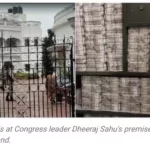New Delhi, In a significant development, Trinamool Congress (TMC) leader Mahua Moitra faced expulsion from the Lok Sabha on Friday following an Ethics Committee report. The report, prompted by allegations from BJP MP Nishikant Dubey, accused Moitra of engaging in ‘cash-for-query’ practices by sharing Lok Sabha login credentials, labeling it as ‘Unethical Conduct’ and ‘Contempt of the House.’
The report specifically called for a thorough investigation into the alleged ‘quid pro quo’ cash transaction between Moitra and businessman Darshan Hiranandani.
Legal Options for Mahua Moitra:
Despite the expulsion, Mahua Moitra retains the option to challenge the decision in the Supreme Court of India, as outlined by former Lok Sabha Secretary General PDT Achary. However, it’s noted that Article 122 of the Constitution provides immunity to parliamentary proceedings from court challenges based on alleged procedural irregularities.
Achary cited the 2007 Raja Ram Pal case as a precedent, where the Supreme Court clarified that restrictions under Article 122 were limited to “procedural irregularities.” This suggests that there might be cases where judicial review could be warranted.
Additionally, reports suggest that Moitra could appeal to the Supreme Court or the high court on grounds of natural justice and fair hearing principles. This could involve challenging the jurisdiction and conduct of the ethics committee, arguing that it overstepped its mandate, and deeming the proceedings as “irregular.”
Furthermore, Moitra may explore avenues of claiming bias, prejudice, or other types of misconduct within the committee’s operations, addressing senior government or Parliament officials through her party or independent channels.
In summary, while the expulsion stands, Mahua Moitra has legal avenues available, presenting a complex scenario that intertwines constitutional provisions, past legal precedents, and the principles of natural justice. The unfolding legal proceedings will undoubtedly be closely watched for their implications on parliamentary conduct and disciplinary measures.







